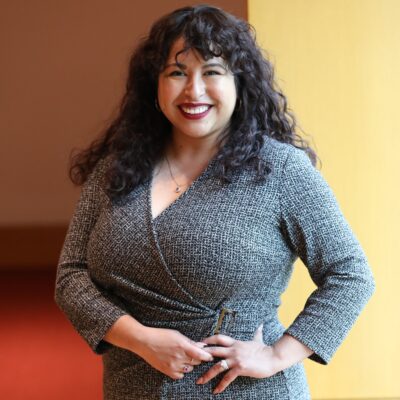Postdoc Spotlight: Evelyn M. Ambríz

April 22, 2024
Evelyn M. Ambríz ’11, M.P.A. ’15, is a postdoc in the Graduate School from Ithaca, New York and Garland, Texas. She holds a bachelor’s degree in development sociology and a M.P.A. from Cornell University and a Ph.D. in higher education leadership and policy from UT Austin. Her research focuses on gatekeeping, diversity, and inclusion in organizations historically segregated by race, gender, and class.
What is your area of research, scholarship, or work and why is it important?
I draw from organizational and sociological theory to examine gatekeeping, diversity, and inclusion in organizations historically segregated by race, gender, and class. I am particularly interested in hyperprivileged spaces with a plethora of resources to help their members build wealth and access professional and academic opportunities. The organizations I examine are embedded with tradition, secrecy, vestiges of segregation, and strong affinity-based connections. Examples include secret societies, historically White only fraternities, country clubs, and good ole’ boys’ clubs.
What are the larger implications of this research, scholarship, or work?
These underexamined sites are reservoirs of old money and privilege, and their members comprise a large portion of government and private sector leaders. Access to membership and internal networks, therefore, provides professional opportunity and collective knowledge of amassing wealth and influence. However, there are vestiges of segregation and Blacks and Latinx/a/os do not have equal access nor opportunity. My work can help individuals access and navigate these organizations; identify pressures and approaches to integration and inclusion; understand the psychosocial impacts from engagement in the organizations; and, ultimately, redistribute resources and opportunities equitably. Examining the internal dynamics of these hyperprivileged spaces also provides insight to inner workings of diversity and inclusion in other secretive, fraternal spaces where decisions are made such as good ole’ boys’ clubs and university governing boards. These organizations are very important to understand because their members have access to a vast network of elites and wealth.
What does it mean to you to be a Bouchet Scholar?
I am honored and humbled to be a part of the 2024 cohort of Cornell University’s Bouchet chapter. Engaging in a community with others who hold similar goals for our work and values including character, leadership, advocacy, scholarship, and service provides a huge opportunity for belonging and collaboration. I believe that when our values and goals align it is easy and welcomed to share information, expertise, and resources. Along with peer mentoring, thought partnerships, and cross-institutional research and other types of collaborations, I am excited for our cohort to accelerate change in our various spaces—while simultaneously supporting other scholars in their pursuits.
How do you exemplify the five pillars of the Bouchet Society—character, leadership, advocacy, scholarship, and service?
First, I seek to always embrace my values and adhere to them even when it is difficult or in conflict with organizational structures. Second, I am committed to leadership and service. I lead to orchestrate collaborations and model inclusive behavior; and I serve to support individuals as they seek social mobility or as organizations advance efforts towards equity. Third, I regularly advocate for others as a mentor: I strive to be a champion, uplift others, and help integrate mentees into new networks. Fourth, I am committed to elevating the voices and experiences of people of color in my research.
What are your hobbies or interests outside of your research or scholarship?
I love spending time at the library, where it’s peaceful and quiet. Outside of reading and writing (because I do enjoy and look forward to those activities!), I absolutely love hiking, following gorge trails, and going to the beach. My wife and I also enjoy hanging out with our menagerie and taking on cooking challenges together. For example, for the lunar new year, I took on a beef wellington; and it was awesome, if I may say so myself.
Why did you choose Cornell?
I chose to return to Cornell as a postdoctoral researcher in mentoring and faculty engagement out of my love for this institution. After completing my undergraduate degree in the College of Agriculture and Life Sciences and my master’s degree in the Cornell Institute for Public Affairs, I found peace, community, belonging, and family in Ithaca. I couldn’t wait to get back!
Do you have any advice for current graduate students?
My advice is best given in a poem:
When things go wrong, as they sometimes will,
When the road you’re trudging seems all uphill,
When funds are low and the debts are high,
And you want to smile but you have to sigh,
When care is pressing you down a bit,
Rest if you must, but don’t you quit.Life is queer with its twists and turns,
As every one of us sometimes learns,
And many a failure turns about,
When we might have won if we’d stuck it out,
Don’t give up though the pace seems slow,
You might succeed with another blow.Often the struggler has given up,
When he might captured the victor’s cup.
And he learned too late, when the night slipped down,
How close he was to the golden crown,Success is failure turned inside out,
The silver tint of clouds of doubt,
And you never can tell how close you are,
It may be near when it seems afar,
So stick to the fight when you’re hardest hit,
It’s when things seem worst that you mustn’t quit.
Author is somewhat unknown and hotly debated. The best authorship citation is Alice Enzie Zimmerman. Written 1948.
